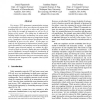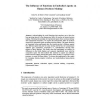25 search results - page 5 / 5 » Cooperation in stochastic games through communication |
AAMAS
2005
Springer
13 years 5 months ago
2005
Springer
Cooperative multi-agent systems are ones in which several agents attempt, through their interaction, to jointly solve tasks or to maximize utility. Due to the interactions among t...
ICNP
2005
IEEE
13 years 11 months ago
2005
IEEE
Peer-to-peer (P2P) anonymous communication systems are vulnerable to free-riders, peers that use the system while providing little or no service to others and whose presence limit...
ICC
2009
IEEE
14 years 19 hour ago
2009
IEEE
— In this paper, we propose a game theoretical approach to tackle the problem of the distributed formation of the uplink tree structure among the relay stations (RSs) and their s...
IVA
2010
Springer
13 years 3 months ago
2010
Springer
Acknowledging the social functions that emotions serve, there has been growing interest in the interpersonal effect of emotion in human decision making. Following the paradigm of e...
HICSS
2005
IEEE
13 years 11 months ago
2005
IEEE
Because today’s workforce is highly mobile, small wireless devices are being used to support mobile work collaboration. However, do computer platform differences affect such col...



